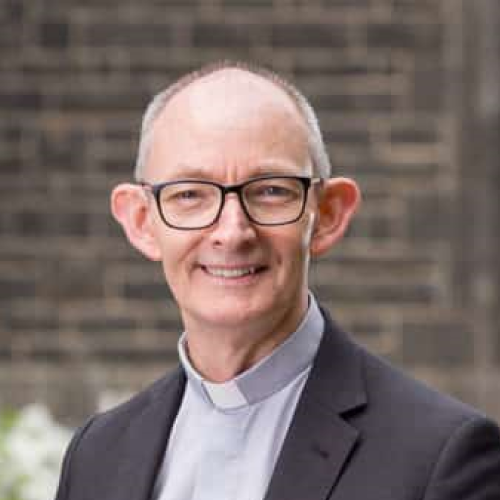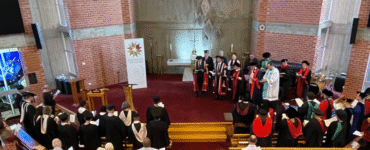Imagine the reaction when it was suggested to the English Fellows of Oxford University in the summer of 1939 that classes may have to be suspended due to the impending outbreak of war in Europe!
One of those English Fellows, C. S. Lewis, who had himself served as an officer in the trenches of northern France during the Great War, knew better than most the trauma and life-changing disruption such a crisis could generate. Preaching in St Mary’s Church Oxford on 22 October 1939, just after England and its allies had declared war on Nazi Germany, Lewis challenged his hearers to reflect on what it meant to pursue their studies in a time of international crisis. ‘How can we continue to take an interest in these placid occupations when the lives of our friends and the liberties of Europe are in the balance?’
Lewis encouraged his students to learn from history. In every age, human society and endeavour has been vulnerable to disruptions and crises. ‘Human life has always been lived on the edge of a precipice,’ he said. If people ‘had postponed the search for knowledge and beauty until they were secure the search would never have begun.’ Indeed, many of the greatest achievements of humanity have emerged from the most terrible of events and circumstances.
So the greater the crisis, the more vital it is to carry on in the pursuit of knowledge, wisdom and beauty. And that means the unexciting, day-to-day effort of learning. Lewis recalled thinking when he joined up for World War I that soldiers must spend their entire day thinking about the war and fighting. How surprised he was to find that daily life in the trenches was full of talk about ordinary, mundane things! A time of great crisis, a global war or pandemic, is a time to focus on the daily, ordinary tasks that improve our lives and build up society.
In fact, the crisis makes clear what is always the case. Our lives and our circumstances are precarious and uncertain. We are profoundly vulnerable to our environments and dependent on one another in all aspects of our lives. And death will come to us all, whether unexpectedly in war or plague, or longed-for after a long life. What gives our daily tasks their real purpose and quality, Lewis urged, is that whatever we do, we work at it ‘as for the Lord’ (Col 3:23).
So a time of crisis raises particular challenges for those dedicated to the pursuit of knowledge and learning. Ours is not the front-line contribution of those working in hospitals and clinics, serving food and cleaning streets, responding to emergencies and protecting neighbourhoods. But the search for truth, goodness and beauty must yield its own contribution to the strengthening of the human spirit and the good of society. And we must put all our efforts into making that contribution. This is the vocational dimension of the academic life. ‘The intellectual life is not the only road to God, nor the safest, but we find it to be a road, and it may be the appointed road for us.’
Lewis offered his hearers three strategies from wisdom of the Christian life to help them negotiate the turbulence descending on their lives. These strategies may be useful for us in this time of pandemic.
First, don’t be distracted by the continuous and ever-present attention focus on the crisis. There is always another news report or notification or website update we could be distracted by. Digital and broadcast media thrive on creating a sense of urgency and ‘breaking’ news in the 24/7 cycle. But isn’t every day of academic study a struggle with distractions of one kind or another? When you find yourself absorbed in thoughts of the crisis, gently return your attention to today’s tasks.
Second, don’t put off till tomorrow…The severity of restrictions and uncertainty about the future we are all enduring at present can cause an attitude of ‘I’ll do it later’ or ‘I’ll wait and see’ about our daily tasks. If we are perfectionists, we don’t want to produce work while feeling stressed, without full access to every resource, and isolated from our usual supports. When there is a task to be completed, just do it!
Third, don’t let fear take over. Lewis alerts us to the ‘illusions of the imagination’ that lurk in our hearts and minds in a crisis. Certainly, we are surrounded by scenes of great suffering and sadness around the world; locally, many people are struggling with loss of work and income, caring for children and older relatives, or pressures on mental health. But fear can feed on these scenes, grip our hearts and paralyse our efforts to keep living productively. Better to name the fear and release its hold on our hearts, so we can get on with the job of caring for one another and putting our best efforts into our daily work.
Lewis encourages all involved in the vocation of learning to make the most of the opportunity this crisis presents. ‘If we thought that for some souls, and at some times, the life of learning, humbly offered to God, was, in its own small way, one of the appointed approaches to the Divine reality and the Divine beauty which we hope to enjoy hereafter, we can think so still.’
The text of the sermon by C. S. Lewis, ‘Learning in War-Time’, can be found at https://bradleyggreen.com/attachments/Lewis.Learning%20in%20War-Time.pdf

Reverend Dr Kevin Lenehan is a priest of the Catholic Diocese of Ballarat in Victoria, ordained in 1993. He holds degrees from Monash University, Melbourne College of Divinity, and the Catholic University of Leuven, Belgium. He is the Master of Catholic Theological College and has previously held roles at the College of Associate Dean (Postgraduate & Research) and Senior Lecturer in Systematic Theology. His academic work is in the areas of fundamental theology, theological anthropology, religious education, and Bonhoeffer studies.






Thank you so much, Kevin! Wonderful reflections. I’m inspired that Lewis also found time during those dark times to write for children — relocated to the country during the Blitz to big old houses with mysterious wardrobes . . . May hope and imagination be kept alive for our youth too.